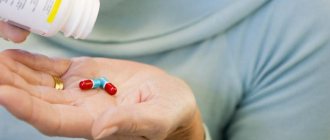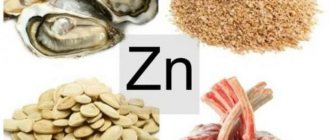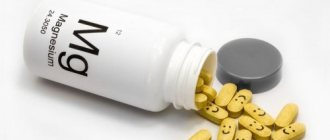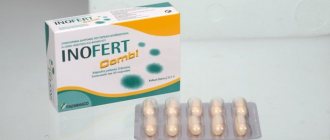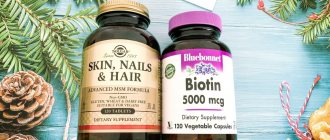When scientists first discovered this substance, they called it “vitamin H,” which means “Haar und Haut”—German for “hair and skin.”
We will talk about biotin, which is most often mentioned in the context of hair health.
But in fact, biotin has many more beneficial properties and important functions. We will tell you about them in our article, and at the same time we will give you a hint in which products to look for this “beauty vitamin” and what to do if your body lacks it.
Biotin is one of the B vitamins, namely B7.
Biotin is a water-soluble substance that not only improves our appearance, but also affects our overall health. Its name comes from the Greek word “biotos”, which can be translated as “life”, “feeding” or “life-giving”. And it very well reveals the very essence of this substance, because the quality of our life directly depends on it. Biotin is a coenzyme, that is, one of the B vitamins that help the body convert food into the energy we need for a full existence. Its importance cannot be overestimated, and you will now understand why.
Contraindications and side effects
Before drinking biotin, read the contraindications and side effects. The full list is contained in the instructions for use of biotin vitamins, but the differences between manufacturers are small. The only contraindications are age under 12 years and intolerance to the components of the supplement. Biotin should not be used by pregnant women without a doctor's prescription. The negative effect of biotin on a child’s body has not been confirmed, but it is still best to avoid using supplements unnecessarily.
The list of side effects usually includes allergies, increased sweating, nausea, and swelling. In practice, the likelihood of these effects occurring is almost zero, since the body does not absorb excess biotin, but excretes it through urine and sweat.
Why our body cannot do without biotin
Biotin mainly helps maintain the beauty of skin, nails and hair, the health of the liver, eyes and nervous system. It is also necessary during pregnancy for both mother and child. But its importance does not stop there.
Biotin is essential for the functioning of several enzymes known as carboxylases, and helps maintain some important metabolic processes, such as the production of glucose and fatty acids, at proper levels. And human health depends on how well these processes work.
The most important vitamin for hair, nails and skin
If we get enough vitamin B7, the likelihood of boasting shiny curls, natural manicure and even skin tone increases many times over. Conversely, brittle nails, hair loss and problems like dermatitis are often the first sign of a vitamin B7 deficiency. In a word, it’s not without reason that women love him so much!
Proven help for diabetes
Scientists have found that biotin supplements have a positive effect on blood sugar levels in people with type 2 diabetes. In particular, biotin helps convert glucose into glycogen.
Benefits for athletes
Glucose-related processes are also important for those who play sports. When we actively train, the level of this substance in our blood decreases, and its lack can be felt in the form of weakness, irritability, and a sharp loss of strength. Biotin supplements in the diet help you avoid sudden surges in glucose and maintain a comfortable state.
Central Nervous System Support
Biotin plays an important role in the production of myelin, the protective coating on nerve fibers through which impulses travel. Thanks to the use of high doses of biotin, doctors have achieved sustainable results in the treatment of multiple sclerosis, which affects the myelin sheaths of the nerve fibers of the spinal cord and brain.
Caring for the baby and his mother
Biotin is very important for pregnant and breastfeeding women. Modern doctors note that many of them have a deficiency of various vitamins, including B7. This happens because the body breaks down biotin faster during pregnancy and lactation, giving part of the resource to the child. Additional sources of vitamins allow mothers to avoid health problems such as deterioration of hair, skin and nails. Biotin also has a positive effect on the child's health.
Indications for use
Vitamins with Biotin are prescribed for:
- lack of vitamin H caused by poor nutrition, dysbiosis , alcohol abuse, long-term treatment with anticonvulsants and antibiotics;
- the need to normalize blood sugar levels;
- dysfunction of the sebaceous glands on the scalp, causing dandruff, brittleness and hair loss.
The drug is also prescribed as an adjuvant therapy for muscle weakness, apathy , loss of appetite, dermatitis , drowsiness and chronic fatigue syndrome.
How much biotin do we need per day?
In 1998, the US National Academy of Medicine established the following dietary guidelines for biotin:
| Age | Norm per day |
| 0–6 months | 5 mcg |
| 7–12 months | 6 mcg |
| 1–3 years | 8 mcg |
| 4–8 years | 12 mcg |
| 9–13 years | 20 mcg |
| 14–18 years old | 25 mcg |
| 19 years and older | 30 mcg |
These figures show us the lower limit of consumption - the minimum that we must receive in order to be healthy and beautiful. The European Food Safety Authority (EFSA) recommends increasing the limit to 40 mcg for adults and 35 mcg for adolescents per day, and the Federal Service for Surveillance on Consumer Rights Protection and Human Welfare – to 50 mcg per day.
However, there are situations when we may experience an increased need for biotin:
- confirmed genetic diseases leading to a decrease in vitamin B7 levels;
- pregnancy and lactation period;
- intense sports activities;
- frequent drinking of alcohol;
- serious digestive disorders;
- heavy physical activity;
- excessive consumption of carbohydrates;
- frequent consumption of raw eggs;
- a strict diet that excludes many foods;
- use of antibiotics.
In such situations, it is highly recommended to consult a medical professional, check your biotin level and correct it with vitamin supplements.
To date, scientists do not have enough data to set an upper limit for biotin intake. However, it is known that even increasing the norm during therapy to 300 mg per day did not produce any side effects, so vitamin B7 can be considered one of the safest. This is explained by the fact that biotin is a water-soluble substance and any amount of it that the body does not absorb is excreted naturally.
Rules for using the drug and its features
The standard course of taking the supplement is 1 month. You should take the vitamin before or during meals with plenty of clean water. The best time to take biotin depends on the dose needed. If the doctor prescribed a biotin dosage of 10 mg per day, and the tablets contain 5 mg, then it is better to take them with breakfast and with meals in the afternoon. There are no contraindications for use of this vitamin at any time of the day, but manufacturers may include other elements in the supplement, so read the instructions for use before taking biotin.
Another important question: what to take biotin with for better absorption. The drug is well compatible with all supplements; you should limit your intake only to zinc and pantothenic acid. Magnesium, on the contrary, will complement it well.
Important! When taking the vitamin, limit your alcohol intake. It impairs the absorption of all nutrients.
Which manufacturer should you choose?
The supplement market is extremely competitive, so you need to know which biotin to choose. The main question is: take pure biotin or a vitamin complex containing B7. The answer to this depends on the daily requirement for the vitamin, as well as its amount consumed with food and other sports nutrition.
There are two leading manufacturers of pure biotin supplements: Solgar and Now. Solgar Biotin is available in 300 mcg tablets and 10 mg capsules for people with more obvious hypovitaminosis. Now Biotin is also available in 10 mg capsules. There are no significant differences between the two manufacturers.
Among the vitamin-mineral complexes containing vitamin B7, Optimum Nutrition products are considered the best: Opti-men for men (100 mcg of biotin per 1 tablet) and Opti-women for women (125 mcg per 1 capsule). You can also pay attention to Maxler VitaMen, this complex also contains 100 mcg of vitamin B7 per tablet, which fully satisfies the needs of a healthy person.
How to determine biotin deficiency
If you live a healthy lifestyle and eat a nutritious diet, it is unlikely that you will be deficient in biotin. Nature has taken care of us by adding vitamin B7 to many of the foods available to us and giving our body the ability to synthesize it on its own.
However, biotin deficiency is also sometimes found and can cause serious problems. That is why we will provide here a list of symptoms that (most often in total) indicate the need to urgently get tested for vitamin B7.
You should be wary if you have:
- skin often dries out
- there are symptoms of dermatitis or psoriasis,
- brittle and uneven nails,
- dull brittle hair,
- constant feeling of weakness,
- muscle soreness,
- irritability,
- tendency to depression,
- loss of appetite,
- metabolic disease,
- anemia,
- pale tongue.
What's the best way to get biotin?
What to do if you have already been diagnosed with biotin deficiency? First of all, stop worrying! Biotin is not a rare substance: it is found in many foods and is included in most vitamin supplements (both in pure form and in combination with other vitamins and minerals).
Biotin in products
The simplest and most accessible source of biotin is a nutritious diet. At the same time, it is not necessary to buy delicacies every day; it is enough to include offal, whole grains, eggs and nuts in your menu. For example, the undisputed record holders for vitamin B7 content are pork liver (250 mcg), soybeans (60 mcg), rye (46 mcg), egg yolk (30 mcg), peanuts (17 mcg) and champignons (16 mcg).
| Product | Amount of vitamin per 100 g |
| By-products (liver, kidneys) | up to 250 mcg |
| Soybeans and other legumes | up to 60 mcg |
| Whole grains and cereals | up to 46 mcg |
| Egg yolk | up to 30 mcg |
| Yeast | up to 21 mcg |
| Nuts (almonds, peanuts, pecans, walnuts) | up to 17 mcg |
| Cauliflower | up to 17 mcg |
| Mushrooms | up to 16 mcg |
It should be borne in mind that sometimes food processing and preparation methods change the properties of biotin and make it more or less effective. From this point of view, nuts, vegetables and fruits are best consumed raw. But eggs, on the contrary, must be cooked: raw egg whites greatly reduce our ability to absorb vitamin B7.
Also, remember that gut bacteria also produce biotin. True, we will only be able to find out in what quantity if we undergo special tests.
Biotin in supplements
If you think you are not getting enough biotin from your diet, you can take a daily supplement. Vitamin B7 is sold in capsules, tablets or solutions.
Injections are very rarely required. The dosage must be prescribed by a doctor, and the course of treatment lasts on average about 1 month.
Cosmetics with biotin
Treating your hair and skin with shampoo or vitamin cream alone is hardly a good idea. As a rule, if we have a biotin deficiency, it must be replenished first from the inside. However, as an extra help, hair and skin care products with B7 are a great solution that should not be neglected.
SUCTION AND EXCHANGE
After the compound enters the digestive tract, a large amount of vitamin H is concentrated in the human liver and kidneys, then supplied to all organs.
Vitamin B7, which comes from food and is bound to protein, is initially released under the influence of proteolytic enzymes, then absorbed by the intestines, deposited in the adrenal glands, kidneys, and liver. At the same time, biotin is partially bound by serum albumin. The level of vitamin in the blood remains virtually unchanged.
In healthy people, biotin excretion in urine is 11-183 micrograms per day (Oppel). In the event of the onset of B7 vitamin deficiency, the excretion of the compound in the urine is reduced to 3.6 - 7.3 micrograms. When more than 300 micrograms of the substance is introduced into the body, there is a significant increase in the concentration of the nutrient in urine, and after 6 hours 30–50% of biotin is excreted naturally. Under these conditions, the content of coenzyme R in feces remains virtually unchanged. Normally, the level of the substance is in the range of 322 - 393 micrograms per day.
In patients suffering from polio, the excretion of vitamin H increases 3 times.
In women, the content of the vitamin compound in milk in the first days after birth is insignificant, while on the 10th day its level increases to 0.38 micrograms per 100 milliliters. Subsequently, it reaches 0.9 – 11.2 micrograms. Thus, the average content of useful nutrients in human milk is twice as high as immediately after birth.
The story of biotin, where we learn what's wrong with raw eggs
Biotin began to be studied only in the 20th century, namely in 1916, when the American scientist W. Bateman discovered that a diet high in raw egg whites causes toxic symptoms in animals and humans.
About ten years later, biochemists Margaret Boas and Helen Parsons conducted a series of experiments with rats to verify that Mr. Bateman was right, and found that egg whites did indeed have an effect on metabolic processes. But which ones exactly? This was yet to be seen.
In 1936, German-Dutch biochemist Fritz Kögl and his graduate student Benno Tönnies of Utrecht University isolated a crystalline substance from boiled duck egg yolks which they called "biotin", documenting the name for the first time in their paper "Presentation of crystallized biotin from egg yolk". It turned out that it is biotin that “does not like” raw egg whites, due to which it is poorly absorbed, thereby causing many health problems.
In parallel with Koegl, similar work was carried out by the Hungarian scientist Paul Gyorgy, who named the new substance “vitamin H” (remember, we wrote about this at the beginning of the article?), as well as the Americans P. West and P. Wilson, who isolated the compound “coenzyme R” .
As you understand, it was the same biotin, which all scientists recognized by 1940. It was at that time that data first appeared on how much biotin/vitamin H/coenzyme R a person needs per day.
Biotin was first synthesized in the laboratory in 1943 by Leo Sternbach and Moses Goldberg.
By the way, it is also important for our little brothers to receive a sufficient amount of biotin, so for cats, dogs, horses, cows and other domestic animals, their own dietary supplements with this vitamin are produced.
